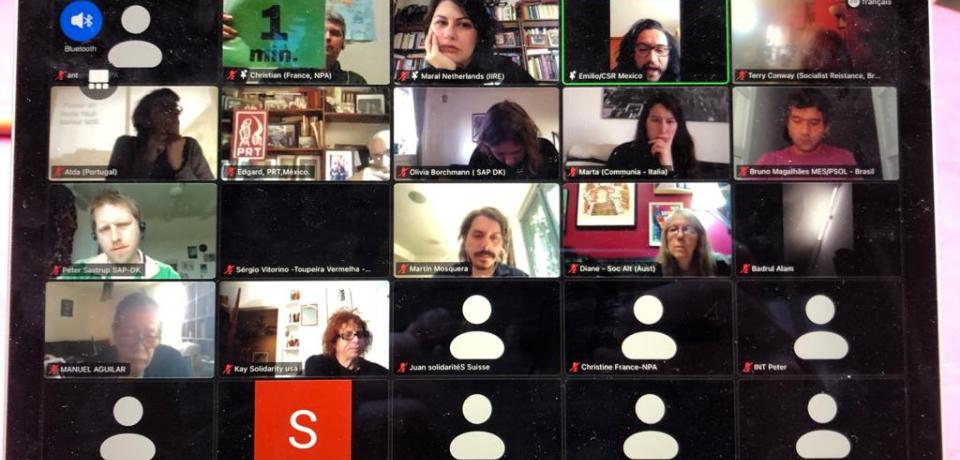
This year we welcomed 64 IC members and 30 observers and guests, from 49 different organizations. In all, there were participants from thirty-nine countries: Algeria, Argentina, Australia, Austria, Bangladesh, Belgium, Brazil, Britain, Canada/Quebec, Colombia, Denmark, Ecuador, France, Germany, Greece, Hong Kong, Ireland, Italy, Japan, Mexico, Morocco, Netherlands, Norway, Pakistan, Pakistan, Panama, Peru, Philippines, Portugal, Puerto, Rico, Russia, South, Africa, Spanish state, Sri Lanka, Sweden, Switzerland, Turkey, USA, Venezuela.
As is our usual practice, the whole meeting was held in three languages, English, French and Castilian, with a team of voluntary interpreters ensuring a simultaneous translation throughout the session. Organizing such a big meeting to be accessible to comrades in time zones as different as Mindanao and Mexico meant a limited number of hours each day, and nevertheless comrades in Australia were attending at 3am their time. That the meeting was held successfully is thanks to the efforts of the interpretation team and others who thoroughly prepared and organized the technical aspects of the meeting, as well as the cooperation of the participants.
The meeting started with the discussion and approval of the text on “The New Rise of the Women’s movement” [2], the result of a long elaboration by the FI women’s commission. It contains a thorough analysis of the context that gives rise to this movement with the changing situation of women, the specific means of struggle adopted by this wave, as well as the tasks for revolutionaries in the movement.
A more conjunctural document of analysis of the international situation was presented by the Bureau of the Fourth International. In it, the COVID-19 crisis is placed among the intersecting economic and ecological crises. A summary of the most important struggles over the last year is also provided, and an outline of the main tasks in rebuilding an antisystemic left capable of challenging the capitalist system and proposing an alternative for the 21st century. The rich discussions during the IC meeting allowed us to complete and improve the text which will be published at the end of March.
This general document was complemented by a report on the situation in the Middle East and North Africa region, ten years after the start of the “Arab spring”, underlining the need to understand it as a long-term process: the uprisings against poverty and unemployment, absolutism and corruption colliding with several counter-revolutionary regimes, but reappearing as we saw with a second wave in 2019- 2020.
Notes on the situation in Latin America discussed in a regional meeting shortly before the IC were submitted to the international discussion at the IC. A further regional meeting will produce a more developed document on this basis. These notes underlined the inability of most of the government to deal with combined health, economic and social crises. While noting the overall balance of forces had not changed it highlighted the reemergence of powerful struggles such as in Chile.
On environmental issues, a motion on the current tasks in the climate movement, in the perspective of the Glasgow COP26 [3] and a resolution on the need for a radical change in the sector of transport [4] were discussed and adopted by large majorities.
On more immediate issues, a resolution in support of the ongoing movement in Myanmar [5], and another one in support of the hunger striker Dimitris Koufodinas in Greece [6]. were adopted.
In the last, closed session, the IC dealt with internal organizational issues. The position taken by the Bureau to suspend links with the NSSP of Sri Lanka [7] was confirmed.
Fourth International
 Europe Solidaire Sans Frontières
Europe Solidaire Sans Frontières


 Twitter
Twitter Facebook
Facebook